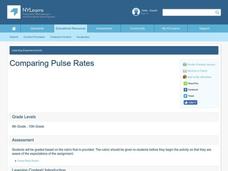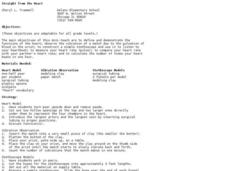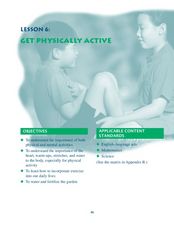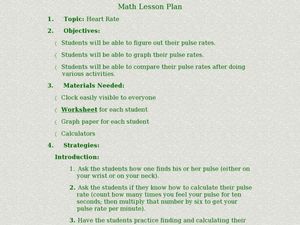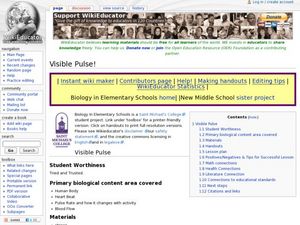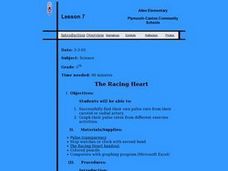Baylor College
Heart Rate and Exercise
What is the relationship among the heart, circulation, and exercise? Your class members will explore first-hand how different physical exercises affect an individual's heart rate. They will begin by learning how to measure their own...
Baylor College
Heart Rate and Exercise
Teach your exercise enthusiasts to read their pulse rate at the radial artery and multiply by four to calculate beats per minute. Learners perform a variety of activities, recording their heart rates after one minute of each. Though...
Baylor College
Heart and Lungs
With a partner, youngsters measure their pulse and breathing rates, both at rest and after running in place for a minute. While this activity is not novel, the lesson plan includes a large-scale classroom graphing activity and other...
Curated OER
Exercise and the Human Heart
Interpret data and learn about the human heart in one activity! After learning about the way blood flows in the body, fifth graders answer two questions about a graph displaying pulse rate. They then take their own pulses to find the...
Curated OER
Regulation of Human Heart Rate
In this regulation of the human heart rate worksheet, students learn to measure their heart rate and design an experiment to test for the affects of a stimulus on the heart rate.
Curated OER
Pulse and Blood Pressure
In this blood pressure worksheet, students compare their heart rate at rest and after exercise and their blood pressure at rest and after exercise. This worksheet has 6 fill in the blank and 12 short answer questions.
Curated OER
Keeping Your Heart in Good Shape: What are the Benefits? - Biology Teaching Thesis
Students name the main parts of the heart and what events occur there. They write a reaction that contains complete sentences, and uses proper spelling and grammar, after viewing a video. Students define the following terms: contraction,...
Curated OER
Comparing Pulse Rates
Students participate in a lab that demonstrate one example of how the human body maintains homeostasis. Students collect data from themselves and observe how their own bodies react to exercise.
Curated OER
TE Activity: The Beat Goes On
Learners determine what the pulse is before examining how to measure the heart rate in different situations. They build a simple device that measures the heart rate, take heart rates, and record them on a worksheet. They discuss how...
Curated OER
The Effect of Math Anxiety on Cardiovascular Homeostasis
Using a pulse monitor, learners will measure a resting pulse, take a math test, and then measure the pulse again. They analyze the change in pulse and compare it to performance on the test. This multi-purpose lesson can be used in a...
Curated OER
Listen To Your Heart Beat
Students listen to their heart beats. In this biology lesson plan, students explore pulse rates and factors that cause them to change. Students also construct both a graph to show variation in pulse rates and a simple stethoscope.
Curated OER
How Does our Heart Rate Change?
Students feel their pulse and describe it. They predict whether certain activities will increase or decrease their heart rates. Students use a heart rate sensor to determine resting heart rates and those after activity. In conclusion,...
Curated OER
Body Voyager
Students explore the significance of a resting and an active heart rate. In this heart lesson students chart data on their pulse and draw a diagram of the heart.
Curated OER
Straight from the Heart
Students explore the heart and its functions. In this lesson about the heart, students use observation to understand the heart. Students construct a heart model, watch the vibration of their pulse, and listen to a heartbeat with a...
Curated OER
Your Beating Heart - Circulatory System
Students illustrate a schematic circulatory system of a human body including heart, lungs, arteries, veins and capillaries. Next, students conduct an experiment to increase understanding of the relationship between heart rate/pulse and...
Curated OER
The Amazing Heart
Students examine human blood flow by comparing the pulse of athletes. In this human body lesson, students discover the equation for finding the cardiac output from a human heart. Students identify heart rates of accomplished...
Curated OER
Get Physically Active
Learners discover the importance of water. In this physical education science lesson, students consider mental and physical activities. Learners find their pulse and measure their heart rate. Students discuss the importance...
LABScI
Circulation and Respiration: Vital Signs
What do your vital signs tell your doctor? An engaging hands-on lesson has your learners monitor their own lung capacity, blood pressure, and heart rate. They then connect the vital measures to the workings of the circulatory and...
Curated OER
Graphing Heart Rates
Students explore heart rates. They record pulse rates, predict which exercises cause a faster heart rate, make a chart, and graph the results. Students write an essay using the data to support their predictions. They write a hypothesis...
Curated OER
The Circulatory System - Part IV
First graders explore the heart muscle. They discover that the heart beats faster during exercise. Students locate their heart with a stethoscope and imitate the sound their heart makes. Students locate their carotid pulse before and...
Curated OER
Visible Pulse
Students record their pulse rate. In this circulatory system instructional activity, students use a piece of clay and a straw to make their pulse move visible and easier to accurately count and record.
Curated OER
The Racing Heart
Fifth graders locate their own pulse rate from their carotid or radial artery, and graph their pulse rates after completing various exercise activities. They graph their data on a pie graph using Microsoft Excel software.
Curated OER
Changes in Pulse Rate
Eighth graders practice making observations and collecting data after determining a baseline pulse rate then collect data on the changes in that rate with exercise. Students must organize their data and analyze their observations.
Curated OER
Health - Respiration
Here is an interesting and engaging lesson on the lungs and the respiratory system. In it, fourth graders should gain a better understanding of how the lungs work and the role they play in supporting life. Some good, in-class partner...







